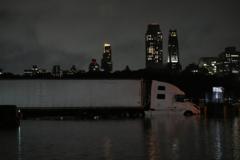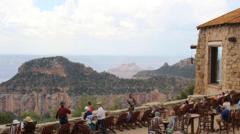Air quality alerts have been issued in Canada and the northern United States as wildfires continue to spread, prompting officials to advise residents, particularly vulnerable populations, to stay indoors.
Air Quality Alerts Issued Across Canada and U.S. Amid Ongoing Wildfires

Air Quality Alerts Issued Across Canada and U.S. Amid Ongoing Wildfires
Residents are warned to limit outdoor activities as wildfire smoke significantly degrades air quality in affected regions.
Air quality alerts have been activated across Canada and parts of the United States due to the thick blanket of smoke from ongoing wildfires, with health officials advising residents to minimize outdoor exposure. Environment Canada has alerted residents across much of Ontario, noting a significant drop in air quality levels. This week, Toronto experienced some of the worst air quality globally.
In the U.S., similar warnings were issued for Chicago, which remain in effect until Tuesday evening. Authorities are particularly urging precautions for infants and the elderly due to the high levels of pollution. Canadian Prime Minister Mark Carney is expected to meet with emergency management officials in Ottawa as wildfires in Manitoba, Saskatchewan, and northern Ontario have displaced thousands.
Toronto residents are cautioned to avoid outdoor activities, especially those involving sports or exercise, due to the high pollution levels. Specific groups including the elderly, pregnant women, and individuals with existing health conditions are considered more vulnerable to the health impacts of the smoke. In Chicago, the National Weather Service has indicated that unhealthy ozone levels compounded by the wildfire smoke could pose further risks.
The political impact of the wildfire crisis is notable, with six U.S. Congress members recently expressing frustration to the Canadian ambassador, highlighting the interference of smoke on their summer activities. The premier of Manitoba responded to these complaints, defending the severity of the wildfire situation and accusing U.S. lawmakers of trivializing the dangers involved.
As wildfires continue to blaze across thousands of hectares this season, May and June proved particularly catastrophic, leading to the evacuation of around 30,000 individuals in Saskatchewan and Manitoba, where local authorities declared states of emergency. Meanwhile, fires on the Bonavista peninsula in Newfoundland have seen rapid growth, destroying several cabins near Chance Harbour.
Scientists attribute the worsening wildfire conditions to climate change, indicating that Canada is experiencing temperature increases at twice the global average, particularly in its Arctic regions, where the rate is increasing nearly threefold.




















